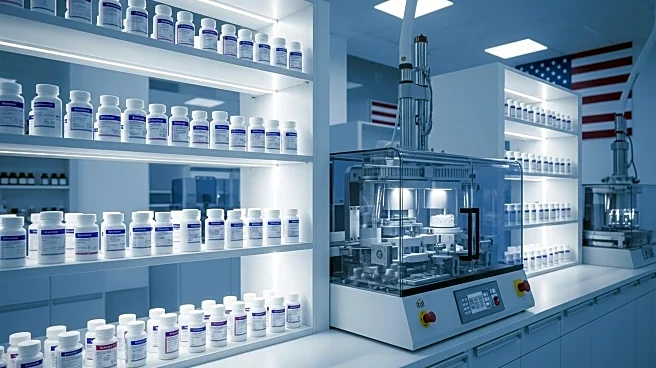What's Happening?
The FDA has initiated a pilot program to expedite the review process for generic drugs that are tested and manufactured within the United States. This move aims to decrease the country's dependency on imported pharmaceuticals. The program offers priority review to applicants who conduct bioequivalence testing domestically and use active pharmaceutical ingredients (APIs) sourced from within the U.S. Currently, over half of the pharmaceuticals distributed in the U.S. are manufactured overseas, with China and India being major suppliers of APIs. The FDA's initiative is part of a broader strategy to bolster domestic drug manufacturing, which includes the FDA PreCheck program launched in August to facilitate the establishment of manufacturing facilities in the U.S.
Why It's Important?
This initiative is significant as it addresses national security concerns and aims to enhance patient access to medications by reducing reliance on foreign drug manufacturing. By encouraging domestic production, the FDA seeks to strengthen the U.S. research and development infrastructure and reduce costs associated with foreign inspections. The move is also aligned with the Trump administration's efforts to promote U.S.-based manufacturing, which includes potential tariffs on imported medicines. This could lead to increased investment in U.S. pharmaceutical facilities, potentially creating jobs and boosting the economy.
What's Next?
The FDA's pilot program may lead to a shift in the pharmaceutical industry's manufacturing strategies, with companies potentially increasing their domestic production capabilities. The success of this initiative could prompt further regulatory changes to support U.S.-based drug manufacturing. Stakeholders, including pharmaceutical companies and policymakers, will likely monitor the program's impact on drug availability and pricing. Additionally, the FDA's efforts to streamline regulatory processes may continue to evolve, potentially influencing future policy decisions.
Beyond the Headlines
The FDA's initiative could have long-term implications for the global pharmaceutical supply chain, potentially reducing the dominance of countries like China and India in the API market. This shift may also prompt discussions on the ethical and environmental considerations of drug manufacturing practices. Furthermore, the emphasis on domestic production could lead to innovations in manufacturing technologies and processes, contributing to the U.S.'s competitive edge in the global pharmaceutical industry.








